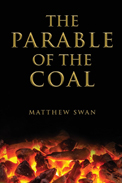
 |
When he moves to a small town, Steve gets off on the wrong foot with his new neighbor, Edgar. Understandably, he balks at his church’s request to invite Edgar to church. Steve’s apology, though, along with a parable, softens Edgar. In the parable, Steve likens Edgar to a cold piece of coal that has fallen out of a fire, easily handleable by anyone, even Satan. Deciding of his own accord to go to church, Edgar would be like a hot coal, Steve tells him, sharing the same source of heat as the whole fire, a heat which warms and also protects him from Satan’s grasp (or Steve’s).
This novella, a short character study of Steve and Edgar, becomes its own parable. Steve’s parable works on Edgar, who goes to church, just as Edgar’s change of heart works on Steve. A friendship develops between the two, shown in a synopsis of their regular get-togethers over the years. Steve changes as much as Edgar, coming to rely on him in an expected manner.
Soft, shaded illustrations at the start of every chapter bring out the transformation of the overall tone, from cold at the initial meeting to warm by the end. Edgar’s backstory, much different than his rough first impression, emerges slowly, in keeping with the narrative’s temperature change. The story uses the natural setting of farms outside a small town. Its lessons are likewise tied to observable phenomena—not abstract but instead concrete and useful. Steve and Edgar’s story may not last for many pages, but dramatic turnarounds make a lasting impact.